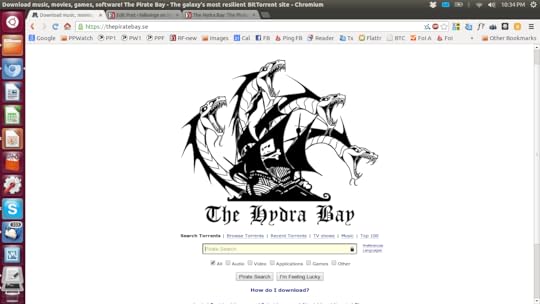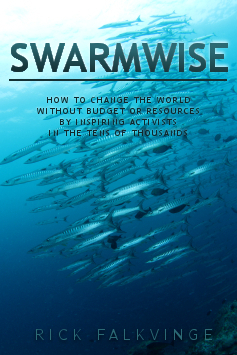Rick Falkvinge's Blog, page 28
February 26, 2013
I’m Sorry I Could Only Afford To Pirate Your Album

Reflections – Zacqary Adam Green: Hey there, indie artist. I just read your blog post about how you wish people wouldn’t pirate your music. Then I listened to the included free track which, evoking shades of John Lennon’s “Imagine,” mused about a future world where there were no more mean, nasty pirates. And I gotta say, I kind of feel bad. Not bad as in guilty, no. Bad as in I feel like a good friend just slapped me in the face.
I get it that you need to eat. I do too. That’s kind of why I pirate your stuff instead of paying you for it. That $9 I didn’t spend on your album went toward my lunch. Yeah, I know, $9 for lunch? It’s pretty ridiculous. The price of food is out of control these days, especially when you’re the underclass living in the most expensive part of the country.
It’s not like I’m on government assistance or anything. I don’t qualify for unemployment insurance because I’ve never been able to find work long enough to qualify. They don’t give you unemployment unless you work full-time, you know, and the world’s not exactly flush with full-time jobs for 4.0 GPA graduates with master’s degrees. Let alone people who didn’t make it through college. I’m lucky if I can find an odd job; forget part-time employment. But at least I’m not a parasite mooching off your tax dollars by taking welfare. I just mooch off of my family, who are postponing their well-deserved retirement to make sure I don’t die.
Now, I suppose I could sell my laptop (a gift), or my smartphone (saved up for it back when I could get minimum wage work), and replace them with less expensive devices with which to play your music. I’d then be able to afford to pay the asking price for your album. After that I’d continue to be stuck living paycheck-to-paycheck, with the added frustration of having a less capable piece of technology to distract myself from the anxiety of my existence.
See, that’s what I was actually doing by pirating your album. I love your music. It really speaks to me, it makes me smile, and it reminds me on days when I’m feeling hopeless that there’s still hope in the world. Or at least it did. Now when I listen to your (fantastic, revolutionary, groundbreaking) album, I just feel like you’re mad at me. Every soulful note, every groovy guitar lick, just has this added undercurrent of sarcasm and contempt to it. “Fine,” you’re saying to me, “I’ll play you some music, you dirty pirate.” With that one angry blog post, you ceased to be someone who could give me a fleeting moment of joy every day, and turned into yet another obnoxious voice putting me down for being a low-income “selfish parasite who doesn’t pull his own weight.”
Look, if it’s really that big a deal, I’ll send you ten bucks once I can spare some after paying for food, for gas, for my phone bill, for co-pays at the doctor, for my medication, and for any other emergency expenses that crop up from time to time. Though I’m probably just going to delete your album from my library since it just kind of bums me out to listen to it now. The point is, I don’t see how this situation has benefited either of us.
Maybe the reason you’re so frustrated with pirates is because you’re in a similar situation to mine. I’m sorry. I really don’t want to make you feel ripped off, or like I’m contributing to your problem. But there really isn’t that much I can do to help you. If I had some money to spare I would have given it to you without you even asking me for it; your music is just that good. And I like you. Well, liked you. Okay, that’s a bit harsh. I’m just disappointed, is all. And hurt. I’ll probably get over it eventually and get into your music again. You’re just so talented.
But hey, can I offer you some advice? Since clearly your business isn’t working out as well as you’d like, which is why you’re getting frustrated? If you’re trying to get more people to give you money, maybe don’t play the guilt trip angle. Especially because most of the people you’re making feel guilty are probably struggling, just like — well — everyone else on the planet right now. Just keep getting people to like you, and ask them to give what they can.
Come to think of it I could probably find, like, a dollar? Two dollars? I might be able to spare that much. Where’s your donation button? Do you have a Kickstarter I could give to? PayPal address? Bitcoin address? Can I Flattr you?
Anyway. You’re not a record label. I expect to be treated like dirt by record labels. You’re a cool person who I saw live on stage at a bar, and then we talked for a while after the show. So I thought maybe there was an understanding. I hope there still is.

The Hydra Bay: The Pirate Bay Moves To Norwegian, Catalan Pirate Parties

Activism: Late Monday night, two new Pirate Parties – those in Catalunya and Norway - started delivering bandwidth to The Pirate Bay. This follows the extortionate threats placed last week against the Swedish Pirate Party by the Rightousness Alliance (formerly the “Anti-Pirate Bureau”) and multiple actions in solidarity with that situation. Being able to stand up against a menacing gale as an international movement is a sign of maturity in the face of dying-but-ruthless adversaries.
The news was supposed to break at 9am sharp on Tuesday morning, but late Monday night, people on the Net were eager to see how the Swedish Pirate Party would respond to the threats from the Righteousness Alliance. The Net would itself tell the story of the move, which I’ll be returning to – the threat letter from the copyright industry that had arrived a week earlier didn’t just threaten the existence of the party as such, but also targeted individuals in the party – “board members and other representatives”.
It is a despicable state of affairs when you have certain inalienable rights, like freedom of speech and the messenger immunity, but lack the financial strength required to exercise those rights by affirming them in court. In Sweden, it was not a matter of finding out in detail what the legal playing field looked like – the lay of the land doesn’t matter when you know the dice are loaded. You could be as much in the moral and legal right as you wanted; we know since before that the court system in Sweden is hopelessly corrupt when it comes to copyright monopoly cases in general, and The Pirate Bay cases in particular.
In essence, it was a game of “Calvinball” – going up against an opponent with the power to change the rules mid-game, and make up new rules out of thin air as the game progressed, without ever telling their opponent.
In the face of this hard decision whether to gamble about the rest of your life with loaded dice to fight for something you believe in, I’m particularly grateful that the operators of The Pirate Bay spared the Swedish Pirate Party the angst, and moved in solidarity with the party before a decision had to be made.
Some oldmedia have erroneously reported that the Swedish Pirate Party decided to fold under threat from the Righteousness Alliance. This is factually wrong on the critical point of the issue. We never reached the decision point of whether or not to fold, thanks to the returned solidarity of The Pirate Bay’s operators, who moved out to other Pirate Parties on their own before that point. By the threat deadline, a decision of whether to fold or not had become irrelevant, as The Pirate Bay was already being supplied bandwidth by other Pirate Parties than the Swedish one.
When I decided to provide The Pirate Bay with bandwidth pro bono in the spring of 2010, in my then-capacity as party leader of the Swedish Pirate Party and as a clearly political activity, the average time from their sign-on with an ISP to the first threatening phone call to that ISP from the Righteousness Alliance was 20 minutes (yes, twenty minutes). I decided to take a stand for fundamental rights ahead of the 2010 elections, calculating that the copyright industry didn’t want to give the Pirate Party that kind of free attention just ahead of the elections. I was right: the copyright industry backed down, and didn’t come back until now, three years later, probably reminded of this state of affairs by the TPB AFK movie where it is mentioned.
I’m happy that my decision in 2010 delayed the moves of this reign of terror from copyright monopoly extremists from twenty minutes to three years. But I’m also delighted to see how we have matured as an international movement for liberty and against this kind of extremism and reign of terror.
That’s why I am particularly happy that we can still stand united as a movement against this rampant corruption in the Swedish legal system and elsewhere. Late Monday night, before the Tuesday deadline, the Internet would tell a different story if you asked it directly where The Pirate Bay was. The net would say that The Pirate Bay was no longer with the Swedish Pirate Party, but with the Norwegian Pirate Party, in Oslo. At least, that’s what the net reported from where I was at the time – from Lisbon, Portugal.
rick@battlecontrol:~$ traceroute thepiratebay.se
traceroute to thepiratebay.se (194.71.107.15), 30 hops max, 60 byte packets
1 192.168.5.106 (192.168.5.106)
2 194-79-94-16.nr.ip.pt (194.79.94.16)
3 195.23.196.91 (195.23.196.91)
4 195-23-199-41.net.novis.pt (195.23.199.41)
5 195-23-98-253.net.novis.pt (195.23.98.253)
6 81.52.179.209 (81.52.179.209)
7 gigabitethernet16-0-0.madcr3.Madrid.opentransit.net (193.251.129.234)
8 po1-101-10G.ar2.MAD1.gblx.net (64.215.195.9)
9 PHONERA-NETWORKS-AB.TenGigabitEthernet6-2.ar1.OSL2.gblx.net (67.17.211.190)
10 82.96.1.213 (82.96.1.213)
11 ge-1-1.oslo-cr-1.piratpartiet.no (80.252.165.2)
But that’s not enough. The Catalan Pirate Party is also serving the Pirate Bay with bandwidth (and it’s kind of random whether you will access The Pirate Bay through Oslo or Barcelona). For each Pirate Party that is threatened by the dying dinosaurs, two more Pirate Parties can take their place as bandwidth providers to The Pirate Bay.
There are 63 (sixty-three) Pirate Parties. And counting.

Screenshot of The Pirate Bay, rebranded The Hydra Bay, late Monday night.
The Pirate Bay announced the move themselves late Monday night with a custom logo, but their description of the events taking place left out a few details. Their story on moving from the Swedish to the Norwegian and Catalan Pirate Parties read, in full:
“A typical Whac-A-Mole machine consists of a large, waist-level cabinet with five holes in its top and a large, soft, black mallet. Each hole contains a single plastic mole and the machinery necessary to move it up and down. Once the game starts, the moles will begin to pop up from their holes at random. The object of the game is to force the individual moles back into their holes by hitting them directly on the head with the mallet, thereby adding to the player’s score. The quicker this is done the higher the final score will be. Current score: zero.”
The first comment on the story sums up first impressions well. In all simplicity, it reads, “Lolwut?”
Pirate Bay operator Winston elaborates how this was Pirate Bay’s decision in returned solidarity with the Swedish Pirate Party’s past hospitality: “As some of you may know, we’re 99% cloud based today. We have, though, enjoyed the great company of the Swedish Pirate Party. As they have gotten a severe legal threat (that will cost a lot to defend against), we’ve taken the decision to move on to Norway and Spain.”
He also hints at more changes to come in the near future: “This is not permanent, though. Next week (hopefully), we’ll announce some MAJOR changes to the site. Now don’t worry, everything will look the same to you. The changes are all under the hood. Let’s just say that it will change a lot of things for a lot of people.”
In a press release on the matter from the Swedish Pirate Party Tuesday morning, the party leader Anna Troberg adds that the Swedish Pirate Party is considering pressing charges against the Righteousness Alliance:
“The party has a board meeting in a few days”, says Troberg. “I will recommend the board to file a police report against the Rights Alliance for unlawful coercion. It is important to determine precisely how forgiving the system is to those who try to abuse the judicial system to silence others.”
The Norwegian Pirates have also published a statement (in Norwegian), where they announce their role as bandwidth supplier and highlight The Pirate Bay’s importance for artistry and civil liberties.

February 21, 2013
Let All Of Europe Have A Referendum On The EU

Transparency – Christian Engström: Great Britain will hold a referendum on the EU in 2017. This is a good thing, but the rest of us Europeans should be given a chance to express our views in a referendum as well.
The EU rapidly evolving towards an ever larger superstate under insufficient democratic control. The British referendum opens a window of opportunity to do something about this. We need a new basic treaty for the EU to replace the current Lisbon Treaty. The new treaty needs to be adopted in a referendum, to give it democratic legitimacy.
The Pirate Party does not have a ready-made proposal for what this new treaty should look like. Instead, we have a proposal for how it should be adopted to get democratic legitimacy. If we can agree on the rules of the game first, it will get easier to have a constructive discussion about the contents of the new treaty later.
We propose the following process for adopting a new basic treaty for the EU:
A proposal for a new treaty is drafted, and all EU citizens get to vote in a referendum if they think that the new treaty is good enough to serve as the foundation for the EU in the future. The referendum should be held on the same day all over the EU according to the principle of one citizen, one vote, regardless of which member state they live in. Holding a common referendum in this way reduces the risk that the process is held hostage by any member state for purely nationalistic motives.
Once the new treaty has been adopted in the big pan-European referendum, each country will decide if they want to be members of the EU according to the new treaty. This decision can be made either in the national parliament or by a national referendum. Countries that don’t want to remain members can take a step back, and just have a free trade agreement with the EU, like Norway or Switzerland have today.
If we can agree from the outset that this is how the new treaty will be adopted, the treaty will automatically have to live up to certain minimum standards.
It will have to be understandable, so that citizens can know what they are voting on in the referendum. It will have to be democratic, so that citizens want it. And it will have to respect the subsidiarity principle and not move more power than necessary to Brussels, so that the member states will want to be part of the new EU.
Who drafts the treaty will be of less importance with this procedure. No matter who does the drafting, the rules for adopting the new treaty will ensure that it is understandable, democratic, and only gives the EU as much power as people really want it to have. Any proposal that fails to live up to this is doomed to be rejected by the citizens and/or member states anyway, so even presenting it would just be a waste of time.
Hopefully, there will be many different proposals from different political parties and other actors. Then we could have a broad debate about what kind of EU we want in the future.
Britain will have its in-or-out referendum in 2017. The EU has until then to shape up, if it wants Britain to remain a member. But this is a good thing for all European citizens, not just the Brits. In the rest of Europe we are an additional 450 million citizens who also want a more democratic EU. To get this, we need a new treaty.
It is excellent that prime minister Cameron and Great Britain has put pressure on the EU by giving a date for the British referendum. That gives us a concrete timeline to work with, and opens a window of opportunity for reforming the EU to make it more democratic, more transparent, and generally more sensible.
The first step towards such a new treaty would be to decide that it will have to be adopted in two steps, first in an EU-wide referendum, and then by each of the member states that want to remain a member. This will ensure that the new treaty has proper democratic legitimacy, and is acceptable to a majority of the citizens.
It will also set the stage for a proper discussion about what we want the EU to be — and not to be. This is a discussion that we really need, and which is long overdue. The plans for a British EU referendum in 2017 has opened a window of opportunity for all of Europe.
This is an opportunity we must seize.
This article was originally published at MEP Christian Engström’s blog.

February 20, 2013
Verdict In Human Rights Court Would Mean Wholesale Censorship Of The Pirate Bay Is Illegal

Freedom of Speech: The European Court of Human Rights in Strasbourg has decided that a wholesale censorship of Google Sites in Turkey violates the European Convention of Human Rights, and orders Turkey to cease the censorship and pay damages. The court concludes that any wholesale web censorship is an interference with fundamental human rights, and therefore must be prescribed by law. This has direct consequences for other, similar wholesale censorship – such as that of The Pirate Bay.
The court and the verdict didn’t mention The Pirate Bay, but it’s the immediate high-profile consequence that springs to mind when reading the verdict. Let’s look at the background first, and then see how it applies directly.
The case concerned a court decision to block access to Google Sites, which hosted an Internet site whose owner was facing criminal proceedings for “insulting the memory of Atatürk”. As a result of the decision, access to all other sites hosted by the service was blocked.
From the verdict:
The Court reiterated that a restriction on access to a source of information was only compatible with the Convention if a strict legal framework was in place regulating the scope of a ban and affording the guarantee of judicial review to prevent possible abuses. [...] The Court further observed that there was no indication that the Criminal Court had made any attempt to weigh up the various interests at stake, in particular by assessing whether it had been necessary to block all access to Google Sites. [...] The courts should have had regard to the fact that such a measure would render large amounts of information inaccessible, thus directly affecting the rights of Internet users and having a significant collateral effect. [...] The effects of the measure in question had therefore been arbitrary and the judicial review of the blocking of access had been insufficient to prevent abuses. There had therefore been a violation of Article 10 of the Convention.
The court held that Turkey was to pay the applicant 7,500 euros (EUR) in respect of non-pecuniary damage and EUR 1,000 in respect of costs and expenses.
The European Court of Human Rights is placed under the Council of Europe, which encompasses all of continental Europe, the United Kingdom, Iceland, Russia, Turkey, and a few more hangarounds, with the notable exception of Belarus. Every country in that area – all of the EU and about as many countries more – is bound by the court’s decisions.
We observe here that the Court of Human Rights is zooming in on Article 10, the right to share and seek culture and knowledge, just as in the other copyright monopoly case last month:
“Everyone has the right to freedom of expression. This right shall include freedom to hold opinions and to receive and impart information and ideas without interference by public authority and regardless of frontiers.” (ECHR 10)
What the court says, is that unless the specific method of wholesale website censorship by the courts is prescribed and allowed in national law, then no court may order that measure. This is because of article 10, from which there may be exceptions, but only – only – if those exceptions are thus clearly prescribed in law (and a few other conditions). “Wholesale” is key here – it’s the carpet censorship that the court targets.
This verdict has immediate consequences for countries like the UK, Denmark, Finland, and Belgium, where courts have taken it upon themselves to order The Pirate Bay censored off the net wholesale. While the cases there were civil cases, the censorship was still determined by a branch of the government, namely the courts – and unless that measure and method is specifically allowed and prescribed in law, that wholesale censorship is illegal, according to this verdict.
Activists in the UK, Denmark, and anywhere else where The Pirate Bay has been ordered censored wholesale, without an explicit censorship-of-websites law, can and should sue their governments now for violations of human rights, referring to this verdict. You should have some thousands of euros to collect, it would seem. Some thousands of euros each.
Other articles on the verdict: Article 19, European Digital Rights Initiative, Techdirt.
Unfortunately, this verdict has no weight on the current threat directed at the Swedish Pirate Party from the copyright industry lobby.
(Hat tip to Brokep for the newstip.)

February 19, 2013
Copyright Industry Lobby Threatens Swedish Pirate Party With Criminal Charges Over Providing Bandwidth To The Pirate Bay

Corruption: This morning, Sweden’s copyright industry lobby sent a nastygram to the official address of the Swedish Pirate Party, threatening criminal charges over providing bandwidth to The Pirate Bay. The Swedish Pirate Party has been the Internet Service Provider to The Pirate Bay since spring 2010, as recently highlighted by the film TPB AFK. Internet Service Providers, unless hosting something themselves, enjoy common carrier status or messenger immunity – i.e., they are never responsible for what is communicated in their pipes.
The letter was sent by the organization formerly known as the Anti-Pirate Bureau, now deceptively renamed the Rights Alliance. It was addressed to the party’s official address, and was also sent directly to all board members of the party. The party responded with a press release, where party leader Anna Troberg doesn’t mince words:
“The operations of the Pirate Party are fully legal, and legal operations shouldn’t have to endure threats like this one”, says Troberg. “It’s not illegal to provide The Pirate Bay with internet access. There is no list of illegal sites that ISPs are not allowed to connect to the net.”
Unfortunately, the kind of blackmail directed at the Pirate Party at this time is far too common. Large and small ISPs alike are commonly victim for similar threats from the copyright industry lobby.
“When the copyright industry lobby thinks the law isn’t enough, they take the law in their own hands, and threaten individuals and small firms that can’t defend themselves against the copyright industry’s wealthy giants”, says Troberg. “It’s depressing that they are allowed to continue this modus operandi with the blessings of legislators and judges alike.”
Unsurprisingly, the threat letter is quite dishonest in its construction – it claims that the Pirate Party, by being an Internet Service Provider, is taking part in copyright monopoly violations. (That may be so, but so are the server manufacturers; that’s irrelevant. It’s a matter of whether you have criminal or civil liability as an ISP, and the answer so far has been a clear “NO” in all cases that have gone to a full trial.) The letter then makes a gigantic leap of logic and menacingly recalls the verdicts of the Pirate Bay trial, hinting at criminal charges for people involved.
The full letter reads, in translation:
Taking part in copyright [monopoly] infringement
The rights alliance represents Noble Entertainment, Nordisk Film, and SF, et al., who hold the exclusive rights to many Swedish movies unlawfully made available to the public through The Pirate Bay. In February 2012, the Supreme Court [of Sweden] decided to not take the case in the so-called Pirate Bay trial. Through this decision, it was legally settled that not only those who operate an illegal file-sharing service, but also those who provide internet access to such an illegal service are committing a criminal act. Despite this having been tried and clarified, you have continued the operations. Since other legal options are exhausted, it remains for us to require you to cease and desist with providing internet access to The Pirate Bay.
Through this letter, you are formally notified that infringements in exclusive rights protected by the copyright [monopoly] law are taking place through The Pirate Bay, and that you are taking part in these infringements by providing internet access to The Pirate Bay.
According to copyright [monopoly] law, somebody taking part in infringement can be ordered by court to cease operations by threat of heavy fines for noncompliance, as well as ordered to pay damages for the damage caused by taking part [in infringement]. These rules apply to legal entities, including non-profit organizations such as The Pirate Party and Serious Tubes, their board members, and other representatives of the organizations.
The liability for taking part in infringement is considerable, according to copyright [monopoly] law. Four people have been sentenced to prison terms and considerable damages for taking part in copyright [monopoly] infringements, e.g. for having taken part in the operations or provided broadband connections or internet access to The Pirate Bay. Further, the Svea Court of Appeals have banned two companies by penalty of SEK 500k from, in one case providing internet access to The Pirate Bay, and in the other case provide internet access to a tracker used for illegal file-sharing ([rambling of a large number of court case numbers]).
Considering this, the rightsholders that we represent request that the Pirate Party and Serious Tubes immediately cease and desist in providing internet access to The Pirate Bay. Unless a response is received by February 26, 2013 that taking part in the infringements have ceased, the Rights Alliance will file charges before a court without further notice.
If you wish further information, you are welcome to contact us.
Sincerely,
Sara Lindbäck
Rights Alliance
Do note the dishonesty here – the four people sentenced in The Pirate Bay case were all sentenced for having part in the direct operations. The letter states that they were sentenced for having part in the operations or for providing bandwidth, which is lexically true, but they might as well have added …or for jaywalking; that’s not what they were convicted of and the letter is clearly written to imply liability where there wasn’t any.
It’s not illegal to lie through your teeth, and these bastards know it.
It is further notable and curious that the threat letter is using the term taking part (sv. medverkan), which has no legal meaning whatsoever. The legal term that implies liability is aiding and abetting (sv. medhjälp). This cannot be an oversight, but must be deliberate.
However, being in the right and being found to be in the right are two completely different things, and the court system in Sweden is bought and paid for lock, stock, and barrel on these matters, as we have seen before. Troberg hints that you don’t win the war by valiantly dying in battle for your country – you win the war by making bastards on the other side die for their country, and that the party is reviewing its options:
“Similar cases have been characterized by runaway judicial corruption, and that fact is something we need to take into account when deciding how to proceed. Today, the fact that operations are fully legal is no guarantee for a fair and just trial. That’s exactly why the Pirate Party exists, and is more needed than ever”, Anna Troberg ends the official statement.
On her own blog, Anna Troberg follows up, “I never thought me and my friends would risk going to court because of our political activities. Not in Sweden. Not in the 21st century. Not when we haven’t broken any law. [...] Today, it no longer matters whether you’re a criminal or not. It’s enough that somebody with enough muscle thinks that what you do should be criminal, for you to get in trouble.”
The letter states that the copyright industry lobby expects a response by February 26, in a week from today. This story is to be continued.

February 15, 2013
How To Install Nvidia Drivers In Ubuntu 12.10 Quantal

Offbeat: Installing standard binary drivers in Ubuntu 12.10 64-bit was easily the worst experience I’ve had with installing standard drivers in 20 years, due to three (3) interacting bugs that each should never have made it past release. Here’s a writeup for anybody else to avoid that experience that sucked a day out of my life.
First, the short writeup on how to solve the problem. More detail will follow about what the problem is, but I picture most people who find this page will just want to solve it. (Some keywords for Google: Black screen, Nouveau failure, Jockey missing, Installation fails.)
Environment: 64-bit Quantal, NVidia 640, triple HD screens 1920×1080.
First, on a fresh install, don’t login to the graphic interface, but press Ctrl-Alt-F1 at the login prompt to get a text console login. Log in there.
Once logged in, become root.
sudo su
Then, install the linux-headers-generic package.
apt-get update
apt-get install linux-headers-generic
Once that is installed, we need to upgrade the kernel to match the recently-installed headers, and reboot to load the new kernel we just installed.
apt-get dist-upgrade
reboot
After reboot, log in again (Ctrl-Alt-F1 to do so in text mode). Become root again.
sudo su
Now, it’s time to actually install the nvidia drivers.
apt-get install nvidia-current-updates
After this has been installed, you will get a number of status messages saying you’re done and that the drivers are installed. You are not done. If you reboot now, your computer will boot back to a black screen and be effectively bricked. I spent a full working day tearing my hair at this. There’s one more thing you need to do. You need to give the drivers their initial settings file.
nvidia-xconfig
After this step, you can finally reboot and use fast drivers, as the open source drivers aren’t there quite yet.
reboot
The three four bugs here
So there are three bugs in the release that create this horrible experience with a new installation.
The first bug is that the linux-headers-generic package isn’t installed by default. This leads to a failure when installing new drivers, such as the nvidia-current or nvidia-current-updates package, as it can’t compile its module and will fail to install properly.
Also, I suspect this is the reason that the driver installation under the rightmost tab in “Software Sources” fails (or that could be another, separate bug).
The second bug is that once installed, linux-headers-generic installs the wrong version of headers. This may be working as intended, but the resulting experience is horrible. The fresh system boots into kernel 3.5.0-17, but the headers installed are version 3.5.0-23 – so trying to install binary drivers after having installed headers will fail, as there are no headers matching the kernel. You must first upgrade the kernel to match the headers you installed, and only then can you install the graphics drivers, which will be able to find headers matching the running kernel.
The third bug is that the script of the install packages doesn’t actually initialize the driver settings, leading to a bricked black screen if you just install them and think that’s it. You have to manually run nvidia-xconfig after installation to be good to go.
Seriously, Canonical, I’m a tech person with the skills, dedication and tenacity to make this work. This is nowhere near the concept of “Linux is ready for the desktop”. These are three prio-1 bugs that made it past shipping, and where QA failed.
Oh, and there’s also a fourth bug: the Create Startup Disk utility doesn’t work in Ubuntu 12.10; it fails as it tries to install the bootloader or just past that point. This means – ta-daah – that there’s no way to downgrade and avoid the hassle by reverting to the previous release. That was the real hair-tearing moment for me.
This is not quality.

February 14, 2013
Swarmwise – The Tactical Manual To Changing The World. Chapter One.

Swarm Management: Somewhere today, a loose-knit group of activists who are having fun is dropkicking a rich, established organization so hard they are making heads spin. Rich and resourceful organizations are used to living by the golden rule – “those with the gold make the rules”. New ways of organizing go beyond just breaking the old rules into downright shredding them – leaving executives in the dust, wondering how that band of poor, rag-tag, disorganized activists could possibly have beaten their rich, well-structured organization.
On June 7, 2009, the Swedish Pirate Party got 225,915 votes in the European Elections, becoming the largest party in the most coveted sub-30 demographic. Our campaign budget was 50,000 euros. Our competitors had spent six million. We had spent less than one per cent of their budget, and still beat them, giving us a cost-efficiency advantage of over two orders of magnitude. This was entirely due to working swarmwise, and the methods can translate to almost any organized large-scale activity. This book is about that secret sauce.
A swarm organization is a decentralized, collaborative effort of volunteers that looks like a hierarchical, traditional organization from the outside. It is built by a small core of people that construct a scaffolding of go-to people, enabling a large number of volunteers to cooperate on a common goal in quantities of people not possible before the net was available.
Working with a swarm requires you to do a lot of things completely in opposite from what you learn at an archetypal business school. You need to release the control of your brand and its messages. You need to delegate authority to the point where anybody can make almost any decision for the entire organization. You need to accept and embrace that people in the organization will do exactly as they please, and the only way to lead is to inspire them to want to go where you want the organization as a whole to go.
It is only as you release that control, the kind of control that organizations and managers have held close to heart for centuries, that you can reap the benefits of the swarm: the same cost-efficiency advantage and execution-speed advantage against the competition that the Swedish Pirate Party enjoyed. This book will teach you those methods, from the initial forming of the swarm to its growth and ongoing maintenance and delivery. It will not teach you the underlying theory of psychology and sociology – merely share experiences and methods that have proven to work in practice.
When I kickstarted the swarm of the Swedish Pirate Party, I had posted a rough manifesto on a rather ugly web site and mentioned the site just once in a chat channel of a file-sharing lobby. That was all the advertising that ever happened; the next day, the party had hundreds of activists. Timing, social context, and message is crucial – but if you have those three, your initial swarm will form like bees to honey in hours. Growing it and maintaining it will also be crucial, but those are the next challenges in line. We take one challenge at a time.
As we describe the swarm concept, it is easy to think of pure decentralized amorphous clouds of people, like Anonymous or the Occupy Wall Street movement. However, while these swarms share values, they do not share direction or method. That means they are confined to succeeding on small projects that span a relatively small number of people over a relatively short timespan, even if each of those small projects build gradual awareness of the Anonymous or Occupy brands.
The weak cohesion of the Anonymous and Occupy brands can partially be ascribed to their choice of being leaderless. While this brings resilience, as no leader can be targeted by adversaries, it sacrifices direction and purpose. I’ve found that the typical Internet community methods of inclusion, when combined with strong leadership, works much better to achieve global change than working leaderlessly under little more than a common flag.
I learned some of these techniques while being trained for officer’s rank in the Army, and even more of them by participating in many online communities. But the secret sauce recipe of swarm cost-efficiency was hit only when you took an officer’s training in maintaining strong group values, mixed in the net’s strong participatory values and low-cost mass communication, and added a dash of management experience from the dot-com era at the turn of the century.
That dot-com era was quite special as a manager in the IT field. If your people didn’t like what you said at the morning meeting, they would merrily walk out of the building and have a new job before lunch. Your paycheck was far more replaceable to them than they ever were as employees to you. People didn’t work for the money.
Therefore, this experience carries over directly to working with volunteers, where people don’t work for the money either (as they aren’t getting any). Leadership and positive reinforcement is key.
Perhaps most significantly, focus in the swarm is always on what everybody can do, and never what people cannot or must do.
This sets it completely apart from a traditional corporation or democratic institution, which focuses sharply on what people must do and what bounds and limits they are confined to. This difference is part of why a swarm can be so effective: everybody can find something they like to do, all the time, off a suggested palette that furthers the swarm’s goals – and there is nobody there to tell them how things must or may not be done.
Rather, people inspire one another. There are no report lines among activists. As everybody communicates with everybody else all the time, successful projects quickly create ripples to other parts of the swarm. Less successful ones causes the swarm to learn and move on, with no fingers pointed.
If you want leadership in a swarm, you stand up and say “I’m going to do X, because I think it will accomplish Y. Anybody who wants to join me in doing X is more than welcome.” Anybody in the swarm can stand up and say this, and everybody is encouraged to. This quickly creates an informal but tremendously strong leadership structure where people seek out roles that maximize their impact in furthering the swarm’s goals — all happening organically without any central planning and organization charts.
At the bottom line, what sets a swarm apart from traditional organizations is its blinding speed of operation, its next-to-nothing operating costs, and its large number of very devoted volunteers. Traditional corporations and democratic institutions appear to work at glacial speeds from the inside of a swarm. That’s also why a swarm can change the world: it runs in circles around traditional organizations, in terms of quality and quantity of work, as well as in resource efficiency.
THE SWARM IS OPEN…
A key aspect of the swarm is that it is open to all people who want to share in the workload. Actually, it is more than open – everybody in the whole world is encouraged to pick work items off a public list, without asking anybody’s permission, and just start doing them. There is no recruitment process. Anybody who wants to contribute to the goal, in their own way and according to their own capacity, is welcome to do so. This contrasts sharply with hiring processes at traditional organizations, where people have to pass some kind of test in order to start working for the organization.
The advantage of this approach is that resources of the swarm aren’t spent keeping people out of it, but are spent getting people in to it. Granted, some work will be a duplication of effort since many people will be working on the same thing when nobody gets to tell other people what to do – but the result will be several solutions that are tried in parallel, and the swarm quickly learns which solutions work and which don’t. The workflow becomes an iterative, evolutionary process of trial and error, of constantly adapting and improving, without anybody’s supervision to make it happen.
Being open and inviting is a key defining feature of a swarm.
…AND TRANSPARENT
The swarm isn’t just open, it is also transparent as a defining feature. There are almost no secrets at all. This can be a mind-boggling concept, coming from a traditional organization.
Everything is transparent by default. Financial records are transparent for all to see. Discussions about strategies and tactics are transparent for all to see (and open for all to participate in). Conflicts are transparent for all to see. This is because all discussions happen in places where everyone can see them.
This provides for trust and confidence. Since everybody can see all the information and all the discussions in the entire organization, it provides a very powerful sense of inclusion.
It also provides an extremely effective rumor control. It is an inoculation against distrust, since distrust depends on information starvation and people drawing their own conclusions from incomplete data.
Transparency is also effective at preventing scandalization: there have been several instances in the Swedish Pirate Party where media caught wind of a conflict, sensationalized it in a typical tabloid fashion, at which point a normal organization would have capsized – but since everybody reading the stories were able to go to the source and read the actual and original exchange of words, there were no rumors and there was no “he said, she said”. Conflicts do not escalate beyond control when this transparency is in place.
Of course, this doesn’t mean every discussion over coffee or a drink must be recorded. That would create an untenable workload, and couldn’t be enforced anyway. But it does mean that work isn’t applied to keep some people away from information that is available to other people – so when discussions are held online, they remain recorded and they remain readable.
“Beware of he who would deny you access to information, for in his heart, he dreams himself your master.” — Commissioner Pravin Lal
In the few cases where secrets are kept, they are to protect the privacy of people in the swarm, and anybody can easily find exactly what information is kept secret – and more importantly, why it is kept secret, and who has the knowledge of it.
An example of a legitimate secret in a swarm could be the identities of donors, in order to protect the donors and prevent conflicts of interest as people would consciously or subconsciously try to please the larger donors rather than work toward the overall goal of the swarm. The person administering the bank account and/or credit card records would know this, but would be tasked with keeping it to themselves.
Last but not least, being fully transparent alleviates the problem in traditional chain-of-command structures where somebody in the middle may distort information passed up or down, either consciously or subconsciously, in the scenario where every link in the chain is an information bottleneck. By making all the information available to everybody, nobody will have the ability to distort it to parts of the organization. Conversely, nobody speaks for other people in a swarm, as everybody has their own voice. This prevents factionalization, as there aren’t any traditional middle managers who can set their own goals that conflict with those of the overall swarm.
SO YOU HAVE A PROVOCATIVE IDEA?
You are probably reading this book because you have one or a couple of provocative ideas lurking in the back of your head, and are looking for ways to realize them. Here, then, comes the boring part of realizing them: have you done the math?
All swarms are a matter of quantity. Quantity of people. Like army ants in the Amazon rainforest, it is a matter of overpowering your opponents with sheer biomass through superior ability of organization and ability to channel volunteer energy – using your organizational agility to always be immensely stronger than your adversaries, whenever and wherever you choose to appear, just like the army ants overpower an opponent by their ability to quickly direct and relocate their local biomass advantage.
So this is the first hurdle your idea must pass: are enough people affected by this idea, and can a large enough amount of people be energized to contribute to it in order to pass the critical threshold? Can the threshold be identified, and if so, how many people must get onboard for your idea to succeed?
As we can see, this is where it gets a bit traditional. We must determine what the success criterion for the idea is. What event constitutes success, and what does it take to get there?
For a new political party like the Swedish Pirate Party, the success criterion is easy to determine: get elected. There are many small steps on the road there, of course, and many steps after that goal has been achieved (such as staying elected). But it gives us a tangible goal to work with.
Let’s see how this goal breaks down.
We would need activists in quality and voters in quantity. Politics, after all, is strictly a numbers game. It is a spectator sport performed in public.
In the case of the Pirate Party, the trigger for quantity was file sharing. In 2006, about 1.2 million citizens – voters – in Sweden were sharing culture and knowledge in violation of the copyright monopoly, and didn’t see anything wrong with that, but were still being actively demonized by the establishment.
To get into Parliament, you need 225,000 votes. This meant that if just one-fourth of the people thus demonized were angry enough about it, and didn’t take that kind of treatment sitting down, then the Pirate Party would be in Parliament. That was our goal, posted on the very first day on the website: 225,000 votes. It was credible, it was tangible, it was inclusive, it was world-changing.
Of course, there were other factors in society as well to this conflict, the underlying themes being freedoms of speech and expression as well as general net liberties. But if you start talking about abstract concepts, you’ll just have yawns among your prospective volunteers. We’ll need a large recruitment surface with concepts that are easy to relate to people’s everyday lives in order to grow the swarm to critical mass.
Once inside the swarm, people and activists will strive to understand the concepts on a deeper level. We need that too. But the surface area of the swarm’s idea must be large enough to attain the sufficient quantity of people for success.
Your idea must be possible to break down into that kind of math. How many people engaged at a minimum level, equivalent to voting, buying a product, or signing a petition, do you need to succeed?
You need to identify the group of people affected in a positive direction by your provocative idea, estimate the size of that group, and then make an educated guesstimate as to what portion of this group may engage in the swarm at the lowest level of activation.
However, remember the scale of the quantities of people we’re talking about. Swarms typically engage hundreds of thousands of people, even millions. They’re operated and coordinated by some thousand people who contribute to the swarm in their spare time, and maybe – just maybe – there are one or two full-time people coordinating the bulk of it.
Your swarm may have lower requirements for success than engaging one million people, of course. Only you can know that. But at least, you need to take your best guess at the numbers.
This is hard, because best guesses are all you’ll ever get. For instance, a women’s rights party in Sweden – which is already among the most gender-equal countries in the world – potentially affects a full half of the voter base. But can you activate a large enough portion of those people on the idea of further equalization of the genders? (It was tried. It turned out that you couldn’t.)
In contrast, three years after launch, in 2009, the Swedish Pirate Party got 225,915 votes in the European Elections, securing its first seats. The math had checked out beautifully from my initial estimate of 225,000 votes.
So for the rest of this book, we are going to take a hard look at your idea on how to form a swarm, and see what is required to realize it, the way the Swedish Pirate Party realized its success and started changing the world.
We’ll start with looking at the launch moments of the swarm, and see how intense they can be, and discuss how a scaffolding of go-to people – officers – can be organized in order to enable the swarm all across the ground you intend to cover. We’ll be discussing techniques and methods for the swarm itself, even going down to practical things like handing out flyers, and how you teach people to hand out flyers effectively.
Going from there, we’ll take a closer look at how you can manage the day-to-day operations of the swarm – one portion classic project management, one large portion of wisdom about conflict resolution, and a portion of methods on preserving the swarm’s goals, culture, and values as it grows.
Finally, we’ll take a look at how you use the resulting swarm organization to deliver those large-scale results that change the world, as well as what happens when you succeed too well.
But first things first. Let’s return to that provocative idea of yours, lurking in the back of your head, and discuss how we can begin realizing it.
This is the first chapter of Swarmwise, a book arriving this summer. Did you like it? It’s going to be free to share (it, like this excerpt, is CC-BY-NC), but you can also buy it hardcover.
EXCERPT FROM UPCOMING BOOK

This is a part of the upcoming book Swarmwise, due in the summer of 2013. It is an instruction manual for recruiting and leading tens of thousands of activists on a mission to change the world for the better, without having access to money, resources, or fame. The book is based on Falkvinge’s experiences in leading the Swedish Pirate Party into the European Parliament, starting from nothing, and covers all aspects of leading a swarm of activists into mainstream success.

February 13, 2013
Five Basic Misconceptions About The Copyright Monopoly And Sharing Of Culture

Copyright Monopoly: Five erroneous assertions have kept appearing in the public debate since 1990 about file-sharing vs. the copyright monopoly. These assertions have persisted for 25 years, despite being obviously false. This is a reference article to link to and point at whenever one of them pops up the next time.
It can seem disheartening that factually false – as in 180-degrees wrong, just-read-the-text wrong – arguments persist for a quarter of a century, but there is a lot of money in perpetuating these untruths. If you have fallen for one of these, you are not alone; the first step to understanding the criticism against the copyright monopoly is understanding what it is.
Therefore, as we uncover these misconceptions, we also learn what kind of legal mechanism the copyright monopoly is. (United States law will serve as an example for this article. Legislation is similar elsewhere.)
1. The copyright monopoly is just that: a monopoly.
The first fact is that the copyright monopoly is not property, but a monopoly. Normally, we hate monopolies and other forms of cartels. We raid their asses at dawn and haul them off to court for price-fixing. Property rights, on the other hand, are the basis for the entire economy. No wonder you try to put everything you do in the “property” camp rather than the “monopoly” camp.
We can observe how the copyright monopoly is enabled in the U.S. Constitution, article 1, section 8, which speaks of giving Congress the right to give authors and inventors an “exclusive right” – a legal term we would call “a monopoly” in everyday language. You can also hear this language between copyright monopoly lawyers – they don’t say “we own”, only PR people and lobbyists use that deceptive and erroneous language. Copyright monopoly lawyers are precise in their language. They say “we hold the exclusive rights”.
US Constitution: The Congress shall have the power [...] to promote the Progress of Science and useful Arts, by securing for limited Times to Authors and Inventors the exclusive Right to their respective Writings and Discoveries.
(Some people protest this observation by claiming that property rights, too, are exclusive rights, and so this passage could just as well refer to property rights. That’s deceptive and not true, confirmed by the trivial observation that the US Constitution writes property when it means property, such as in the fifth amendment.)
The United States Constitution will have to serve as an example here. Other constitutions are similar.
Another obvious point to make here is that if the copyright monopoly were property, then the copyright monopoly laws would not have been needed in the first place, as property laws would suffice. But the copyright monopoly laws are on the books, and therefore obviously not dealing with property.
The copyright monopoly is actually four different conceptual monopolies. It is commercial monopolies on duplication and public performance, and it is so-called moral rights to be associated with one’s work and to have the right of veto against conceptual violations of it. These are four quite different mechanisms.
You can help spread understanding of the fact that the copyright monopoly is a monopoly by consistently saying “the copyright monopoly”, just like we do here and others do too.
But copyright monopolists keep asserting the copyright monopoly is a form of property, so are they wrong? More than that. The copyright industry tries to whitewash their monopolies by calling them “property” whenever they can, in order to make their monopolies sound more palatable and justified – but using propagandistic words doesn’t change reality. In particular, this applies for the oft-peddled whitewashing term “intellectual property”, which you should never use except for like I do here, to tell people why it is completely wrong – for what it refers to is neither intellectual nor property. At best, it is industrial-era protectionism. (Just because you call a dogshit “lovely-smelling flower” through intense lobbying, that doesn’t make it smell good or actually be a flower. Don’t parrot lobbyist language.)
The copyright monopoly is a governmentally-sanctioned private monopoly that interferes with and limits property rights.
2. Infringements of this duplication monopoly is not theft.
This leads us to the second misconception: Infringements of the copyright monopoly is not theft. Neither factually, nor legally, nor from any conceivable philosophical angle. This is easily observed by seeing that if an infringement were theft, we wouldn’t need the copyright monopoly laws in the first place – ordinary property law would suffice.
Under Swedish law, there are even more nuances that reinforce this trivial observation. The Swedish word for infringement of the monopoly is intrång, and it is the same legal term as for trespassing on somebody’s lawn without their permission – and the same legal severity. (If you take an apple while on the lawn and eat it, it becomes theft, stöld. If you also take an unlocked bike, use it to get downtown, and leave it there, there’s a middle term – tillgrepp.) So the legal term for infringement is at least two steps away in seriousness from theft – if the comparison can even be made, as it’s conceptually different.
Something given or shared of free will cannot be described as theft in any philosophy, and somebody else is sharing their copy with you of their free will in a typical file-sharing process as you are manufacturing your own copy. It is, however, infringing a governmentally-sanctioned duplication monopoly, which is a completely different beast than property rights.
3. Copying something outside the monopoly channels is not “taking without paying”. It is manufacturing.
The third misconception is that violating the copyright monopoly is just like “walking into a store and taking things without paying”. This argument, which is wrong on every possible level, is inexplicably still heard 25 years after the public debate started.
Making copies isn’t taking anything in the first place. You are not taking anything without paying, you are manufacturing something without paying the monopoly holder. This is completely different conceptually and morally.
When you are making a copy of media that is under the copyright monopoly, you are not taking property from anybody else. You are using your own property – your computer and gadgets, presumably – to manufacture a copy of a file. That’s not “taking” anything. That’s manufacturing something using your own time and resources. Those are two completely different concepts.
You are not taking something without paying. You are manufacturing something without paying protection money to a monopoly holder, which sounds much less wrong than “taking” things. When using proper language, it becomes all the clearer how this monopoly is in all the trouble it should be in.
4. When buying a book or a DVD, it becomes your property in full.
I have seen some people argue that when you buy a book or DVD, you don’t actually own it; that you would somehow pay money to license a set of rights that include the right to sit down and enjoy its entertainment, but would not include the right to copy it. This is factually and legally wrong. When you buy media, you buy the whole media. It becomes your property in full, including everything encoded onto it.
So if it’s your property, why can’t you copy it freely? That’s because another law – the copyright monopoly – steps in and explicitly takes away those rights from you in regards to your own property. Specifically, the U.S. law (which will have to serve as example again) lists six specific actions that people may not take on their own property, but that are reserved for the holder of the copyright monopoly:
USC Section 17, chapter 1, para 106:
[The copyright monopoly holder...] under this title has the exclusive rights to do and to authorize any of the following:
(1) to reproduce the copyrighted work in copies or phonorecords;
(2) to prepare derivative works based upon the copyrighted work;
(3) to distribute copies or phonorecords of the copyrighted work to the public by sale or other transfer of ownership, or by rental, lease, or lending;
(4) in the case of literary, musical, dramatic, and choreographic works, pantomimes, and motion pictures and other audiovisual works, to perform the copyrighted work publicly;
(5) in the case of literary, musical, dramatic, and choreographic works, pantomimes, and pictorial, graphic, or sculptural works, including the individual images of a motion picture or other audiovisual work, to display the copyrighted work publicly; and
(6) in the case of sound recordings, to perform the copyrighted work publicly by means of a digital audio transmission.
Very, very clear. Six specific actions in the law that are reserved for the holder of the copyright monopoly, regardless of whose property it is.
But we observe here, going back to the original erroneous assertion, that if you were only sold a limited set of rights that did not include copying when buying a book or a DVD, the above piece of law would be wholly unnecessary. It wouldn’t make sense at all. Therefore, the conclusion is trivial that the assertion is wrong to begin with.
When you buy a book, a DVD, or something similar, you obtain full property rights to it, including the right to produce as many copies as you wish in any way you like. But then, another law steps in – the law text quoted above – and takes away those six rights from you, the property owner.
This is an important distinction, as these are rights that are perfectly normal for property, and the copyright monopoly creates an exception to your normal property rights.
5. The copyright monopoly is a limitation of property rights.
Misconception number five goes back to the original point of the copyright monopoly being described as “property”. After point four, we observe that the copyright monopoly is a limitation of property rights. This is a point important enough in itself to list as a fifth misconception: property rights and the copyright monopoly don’t and can’t coexist peacefully. The copyright monopoly actively limits property rights.
Thus, if you take your stance in the safeguarding and upholding of property rights, you cannot defend the copyright monopoly and its limitation of said property rights. That’s like defending death penalty for murder with the justification that all life is sacred. There may be other justifications – but that particular piece of logic just doesn’t connect.

February 10, 2013
Why Do Copyright Monopolists Think They Can Just Steal Somebody Else’s Work?

Reflections: Copyright monopolists insist on the idea of controlling the fruits of other people’s labor, such as when other people copy a particular file. This attitude is offensive, insulting, and antithetical to a free market.
The famous philosopher John Locke once published the idea that a person has the right to profit off of the fruits of their labor. This is only partially true: once you have sold something, you hold no further rights to profit off of it. This is fairly obvious, but needs to be stated for context.
An entrepreneur can sell one or both of two things: you can sell products, and you can sell services. If somebody decides to make shiny things and sell them, they have a right to profit off the fruit of that labor – but only up until the point where they sell the shiny things. Their ownership of the shiny thing, and their right to profit, ends the second the item is sold to somebody. Conversely, if somebody decides to sell their time in selling services, their right to profit ends the second they stop working for the person they have sold their time to.
In geek terms, entrepreneurship is finding a value differential in society, constructing a conduit between the two endpoints and sticking a generator in the middle of the conduit. Profit ensues from the generator until the value differential has equalized to the point where the pressure is no longer sufficient to overcome the resistance of the generator, at which point the conduit stops working.
This is how a free market works, and it is regarded as the foundation of our economy. However, copyright monopolists are trying their hardest to muddle this simple and fundamental principle, by claiming a continued kind of ownership even after something is sold. That’s not how a market works. That’s a monopoly. That’s harmful. That’s bad.
We have indeed observed before how the copyright monopoly stands in direct opposition to property rights, sabotaging this foundation of our economy and the fundamentals of entrepreneurship.
So for the sake of argument, let’s assume I am given a copy of the movie The Avengers by somebody. It is one of many copies. There are many ones like it, but this one is mine. It is my property in all its aspects.
However, copyright monopolists would argue that they should continue to control my property. This is not just strange, but offensive. Even worse, when I do some labor on my own property, such as executing a “copy file” command on it, the copyright monopolists claim they should control that labor too – as well as the fruits of it. This is outrageous and has me fuming over their arrogance.
When I manufacture another copy of the Avengers using my own property and my own labor, copyright monopolists somehow believe they have a right to the fruits of my labor. I find that idea offensive and insulting.
It is true that the ease of my labor depends on many people having worked on other things before me. However, this is true with all entrepreneurship. My ability to copy a particular file depends not just on those who created the file, but also on those who invented electricity generators, the modern graphics card, the keyboard, wire insulation, storage media, networking protocols, and many, many other things. This is as ancient as Rome: entrepreneurship has always built on the already-performed work of others, and one set of previous such entrepreneurs do obviously not get any kind of special privileges on a functioning market.
Anybody is free to create shiny things, but their ownership over the shiny thing stops the instant they sell it. That’s how a market works. Claiming control over the fruits of other people’s labor, such as when somebody makes a copy of a file using their own property, is deeply, deeply immoral.
This piece was previously published on TorrentFreak.

February 9, 2013
You’re Still More Likely To Get Hit By Lightning Than Convicted From Sharing Culture

Copyright Monopoly: In 2012, more than twice as many Swedes were hit by lightning as were indicted for sharing culture. This stands in stark contrast with the scare campaigns from the copyright industry. When confronted with facts, the copyright monopoly lobby’s fear campaigns to stop people from sharing freely come across as outlandish at best.
The tallies for last year are in. Ten people were charged in 2012 with violating the copyright monopoly from sharing culture freely, and all of them convicted (as we know that courts can’t be trusted in this field). Ten people out of four million sharing culture on an everyday basis, directly or indirectly.
The copyright industry likes to blow the horns and whistles loudly over each such conviction, cynically holding them up to the public as a dire example. Some people are understandably falling for this. But is a fear of the copyright industry… rational?
As human beings, we have a tendency to adjust our behavior both to avoid and seek one-in-a-million events that will, statistically, never happen to us nor to anybody we have ever heard of. For example, we play the lottery, despite the odds of winning being less than a letter’s chance of arriving by carrier mackerel across the Sahara. We also spend ridiculous amounts of money in the War on of Terror, despite the fact that we should rationally be spending our money fighting bathtubs and stairs instead (five times as many die in bathtubs, and over a hundred times as many falling down stairs).
So is there a rational reason to fear the copyright industry’s tantrums? Let’s compare to being struck by lightning. Are you afraid of being struck by lightning? No? Like most people, you’re probably dismissing it as an insanely improbable event.
It turns out that almost twice as many people are hit by lightning each year as are convicted for sharing culture.
In an average year, 17 people are hit by lightning in Sweden, with last year being exceptional where a lightning bolt struck into the audience at a music festival and hit 19 people at once. In contrast, the copyright lobby is touting 2012 as a record year, with ten people convicted – almost half as many as were hit in one lightning strike last year.
The copyright lobby likes to play on people’s emotions of fear. If you ever feel that fear creeping up as they try to make examples of a few people, remember that you’re still twice as likely to be hit by lightning. Being a good human being involves sharing culture and knowledge with fellow human beings, regardless of any immoral copyright monopoly.
Oh, and as a final note? Those ten people out of four million who were convicted of sharing culture against the monopoly – they were all convicted on the basis on their own confession, something you should never do. The charges were dropped against everybody else.

Rick Falkvinge's Blog
- Rick Falkvinge's profile
- 17 followers



